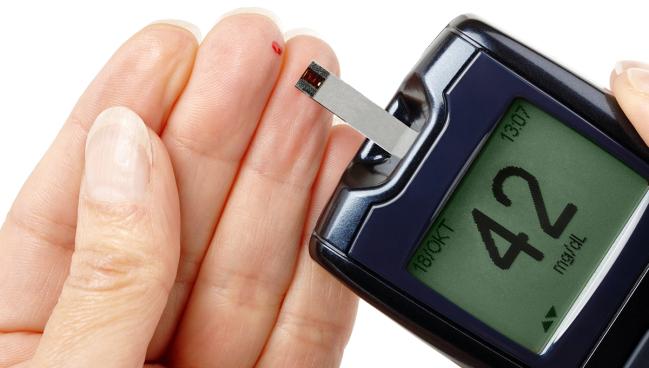No Signs of Hypoglycemia Causing CVD in CAROLINA and CARMELINA
It may be that that low blood sugar is simply more common in the high-risk diabetic phenotype, where MACE are also prevalent.

Hypoglycemia resulting from diabetes treatment does not appear to increase the risk of cardiovascular events, according to a new analysis of two large, randomized trials.
The findings, which were published January 3, 2024, in JAMA Cardiology, challenge a commonly held notion that hypoglycemia may directly lead to adverse cardiovascular outcomes, such as MI, stroke, or even death, say investigators. Rather, these new data suggest the association is due to these patients being sicker and frailer, and thus at higher risk for both hypoglycemia and adverse cardiovascular outcomes.
“We had a hypothesis that while hypoglycemia and cardiovascular events may be related, this might not be a causal relationship,” lead investigator Ahmed Kolkailah, MD (UT Southwestern Medical Center, Dallas, TX), told TCTMD. “It might just be that hypoglycemia and cardiovascular events are both markers of a particularly high-risk and fragile phenotype of patients who are susceptible to both outcomes.”
While hypoglycemia is recognized as a dangerous side effect of antihyperglycemic medications, one that carries medical risks with each episode and substantial symptom burden for people experiencing such episodes, there are observational studies that have found an association between hypoglycemia episodes/burden and cardiovascular events, said Kolkailah.
In 2019, the International Hypoglycemia Study Group (IHSG) published a review looking into whether hypoglycemia increased the risk of mortality or cardiovascular disease in patients with diabetes, noting there is evidence that hypoglycemia can cause cardiac dysfunction and sudden death. However, they also concluded that any relationship between this adverse effect and clinical events was likely to be partly confounded, since both were more likely to occur in high-risk patients with comorbidities.
Simon Heller, MD (University of Sheffield, England), a member of the IHSG who has extensively studied the impact of hypoglycemia, said researchers have been exploring the relationship between low blood sugar and clinical events for nearly 30 years. As far back as 1997, they published research showing that patients with type 1 diabetes had altered ventricular repolarization with lengthened QT intervals during hypoglycemia, a finding that helped explain why some young patients with type 1 diabetes died suddenly in the night.
More fuel was added to the fire with the ACCORD study in patients with type 2 diabetes, said Heller. That trial was stopped prematurely after investigators found that intensive antihyperglycemic therapy increased the risk of all-cause mortality compared with standard therapy, with hypoglycemia linked to higher cardiovascular risk. In the ADVANCE trial, which found that intensive glucose control lowered the risk of vascular events, severe hypoglycemia was associated with cardiac, respiratory, and gastroenterological events.
“Many of us have felt that hypoglycemia does cause bad things, although it’s difficult to prove,” said Heller, a member of the ADVANCE study group. “You can’t do a randomized, controlled trial for ethical reasons.”
CAROLINA and CARMELINA
In an attempt to further understand the relationship between hypoglycemia and outcomes, researchers, including co-first author Nikolaus Marx, MD (University Hospital Aachen/RWTH Aachen University, Germany), conducted a post-hoc analysis of the CARMELINA and CAROLINA trials.
In CARMELINA, 6,979 patients (mean age 65.9 years; 62.9% male) were randomized to treatment with linagliptin or placebo on a background of usual care and followed for a median of 2.2 years. In CAROLINA, 6,033 patients (mean age 64.0 years; 60.0% male) were randomized to linagliptin or glimepiride added to usual care and followed for a median of 6.3 years. The primary outcome of both trials was a composite that included cardiovascular death, MI, or stroke.
There was a bidirectional association, which kind of makes the argument that if hypoglycemia was the cause of adverse cardiovascular outcomes, why is there an association the other way around as well? Ahmed Kolkailah
In CARMELINA, hypoglycemia occurred in 16.5% of those treated with linagliptin and 17.0% of those treated with placebo. Hypoglycemia was associated with a significant 23% higher subsequent risk of the three-part MACE endpoint plus hospitalization for heart failure. There was no significant association between hypoglycemia and mortality. Investigators then assessed the reverse association and found that incident cardiovascular events (nonfatal MI, nonfatal stroke, or hospitalization for heart failure) were tied to a significant 39% higher subsequent risk of hypoglycemia.
“There was a bidirectional association, which kind of makes the argument that if hypoglycemia was the cause of adverse cardiovascular outcomes, why is there an association the other way around as well?” said Kolkailah. “It supports the idea that we may be looking at just a marker of a high-risk patient phenotype.”
For the CAROLINA trial, hypoglycemia was documented in 10.7% of treated patients, with fewer cases reported in those treated with linagliptin than those treated with glimepiride. Overall, there was no association between hypoglycemia and the subsequent incidence of the three-part MACE endpoint plus hospitalization for heart failure, nor any association between hypoglycemia and individual cardiovascular endpoints. In the reverse analysis, there was also no association between incident cardiovascular events and hypoglycemia.
Confounded Results or Cause of CVD
To TCTMD, Kolkailah said they also performed a time-dependent analysis focused on hypoglycemia and cardiovascular events occurring within the next 60 days. There was no temporal link seen in either trial. “The lack of a temporal relationship further supports that it's not a direct causal relationship,” he said. “It's rather co-occurrence of different adverse events in the same frail patients.”
He stressed that their results are not the definitive answer to the debate, especially since this is a post-hoc analysis from randomized trials. More importantly, the findings are not meant to discourage physicians from avoiding or treating hypoglycemia, or from taking it seriously.
“We just want to put this into the right context,” said Kolkailah. “We'll still make every effort to avoid and treat hypoglycemia, take it very seriously, but not with the end goal of doing so being to reduce the risk of cardiovascular events in these patients. We’re treating it because it has other adverse effects, including the patients feeling bad, which is a very important factor to consider.”
In science, it's very unlikely that one explanation just fits all the facts. Simon Heller
Heller thinks the question around whether hypoglycemia causes adverse outcomes is likely to continue. There are observational studies showing higher risks of mortality in the community among those with severe hypoglycemia while other observational analyses have concluded it to be a marker of patient risk instead, he said. In terms of his own thinking, Heller said he believes the answer lies somewhere in middle: hypoglycemia might be a marker of patient risk and it could be the cause of adverse clinical outcomes.
“I don't think we'll ever be 100% sure,” he said. “There are papers which support causality. Other data such as these, which don't. I think we should be thoughtful in not saying it's definitely one or the other. In science, it's very unlikely that one explanation just fits all the facts.”
He noted that animal research might provide some helpful clues: they are studying the effects of severe hypoglycemia in rodents to determine if the condition leads to atherosclerosis.
Michael O’Riordan is the Managing Editor for TCTMD. He completed his undergraduate degrees at Queen’s University in Kingston, ON, and…
Read Full BioSources
Marx N, Kolkailah AA, Rosenstock J, et al. Hypoglycemia and cardiovascular outcomes in the CARMELINA and CAROLINA trials of linagliptin: a secondary analysis of randomized clinical trials. JAMA Cardiol. 2024;Epub ahead of print.
Disclosures
- Marx reported grants from the German Research Foundation and other contract support paid to University Hospital Aachen from Amgen, Boehringer Ingelheim, Sanofi-Aventis, Merck Sharp & Dohme, Bristol Myers Squibb, AstraZeneca, Eli Lilly and Company, Novo Nordisk, and Bayer.
- Kolkailah reports grant support from the National Heart, Lung, and Blood Institute.





Comments